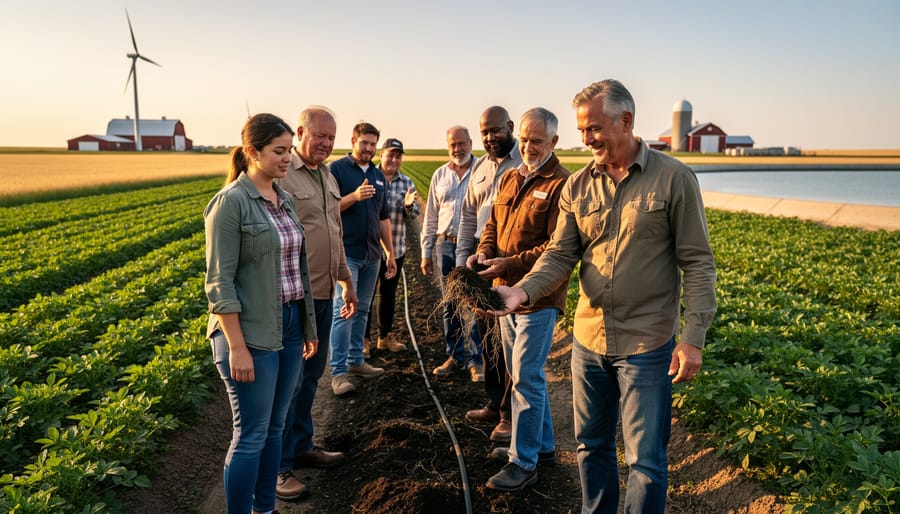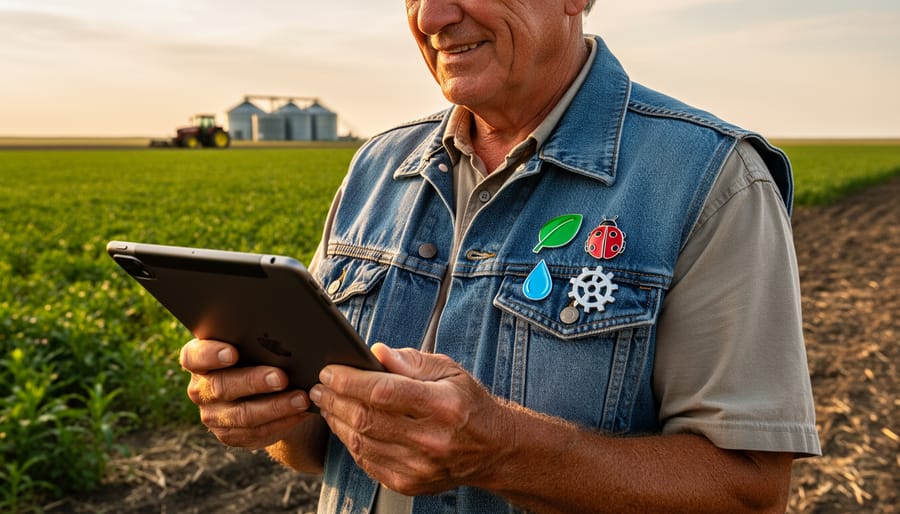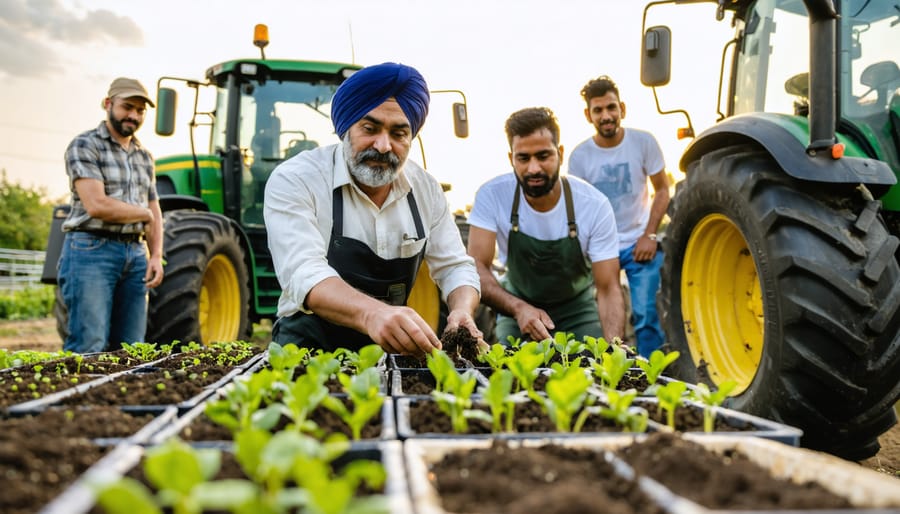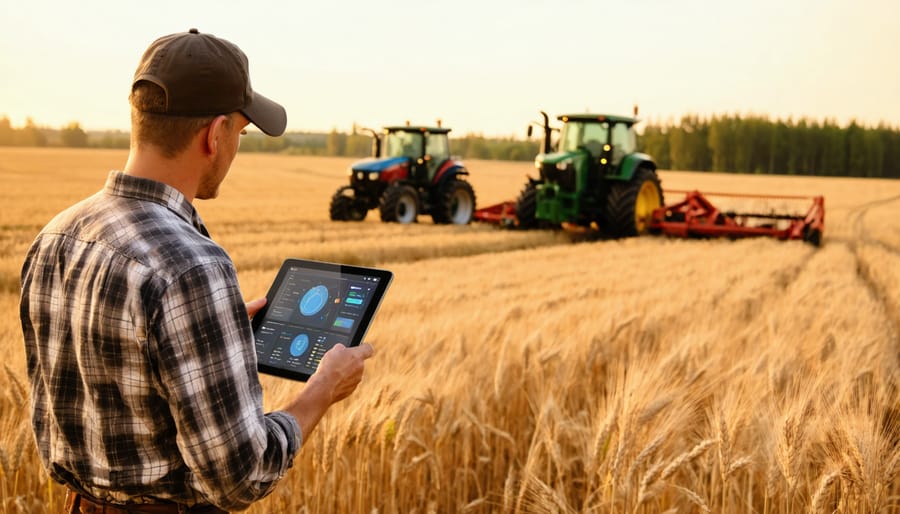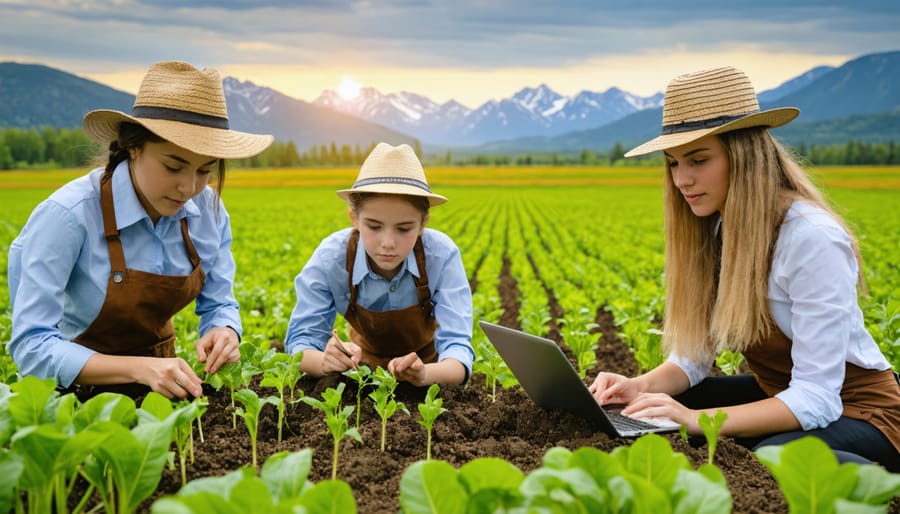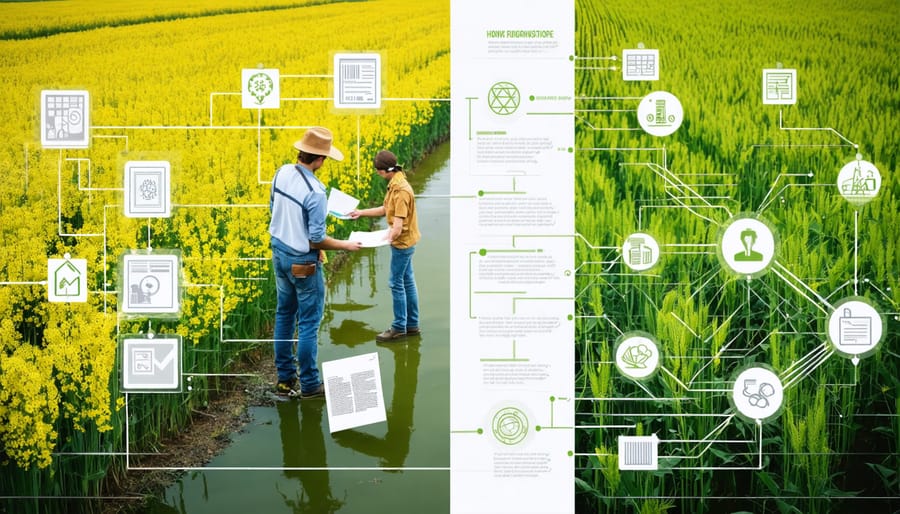Agricultural education stands as the cornerstone of modern farming’s sustainability and success, driving a remarkable rural education transformation across Alberta’s agricultural landscape. As Canadian farmers face increasingly complex challenges—from climate adaptation to market volatility—robust agricultural education programs deliver essential knowledge and skills that directly impact farm productivity and environmental stewardship.
Recent data from Alberta’s agricultural sector reveals that farmers with formal agricultural training achieve 23% higher crop yields and demonstrate 30% better resource management practices compared to those without specialized education. This education encompasses crucial areas from soil health management and precision farming techniques to sustainable water usage and innovative pest control strategies.
Beyond technical skills, agricultural education builds resilient farming communities by fostering innovation, environmental consciousness, and economic sustainability. For Alberta’s 40,000+ farm operators, investing in agricultural education represents not just personal growth, but a commitment to securing our region’s agricultural future through informed decision-making and advanced farming practices.
The Economic Impact of Agricultural Education
Farm Profitability Through Knowledge
The impact of agricultural education on farm profitability is clearly demonstrated through several success stories across Alberta. Take Jim Anderson’s case from Lethbridge County, who increased his wheat yields by 23% after completing the Advanced Farming Systems program at Olds College. By implementing precision agriculture techniques learned during the course, Jim optimized his fertilizer usage and reduced input costs by nearly $75 per hectare.
In the Peace River region, Sarah Martinez transformed her struggling family farm by applying knowledge gained through Alberta Agriculture’s soil management workshops. Within two growing seasons, she improved soil organic matter content and reduced erosion, leading to a 30% increase in canola production and significant cost savings on soil amendments.
The Miller family in Red Deer County provides another compelling example. After participating in the Farm Financial Management series, they restructured their operation, diversified their crop rotation, and implemented strategic marketing practices. Their net farm income increased by 40% over three years, while building more resilient soil systems.
These successes aren’t isolated cases. According to Alberta Agriculture statistics, farmers who participate in continuing education programs report an average 15-20% improvement in operational efficiency. The key lies in combining traditional farming wisdom with modern agricultural science and business management principles. Local agricultural extension offices continue to offer targeted programs that help farmers adapt to changing market conditions while maintaining sustainable practices.
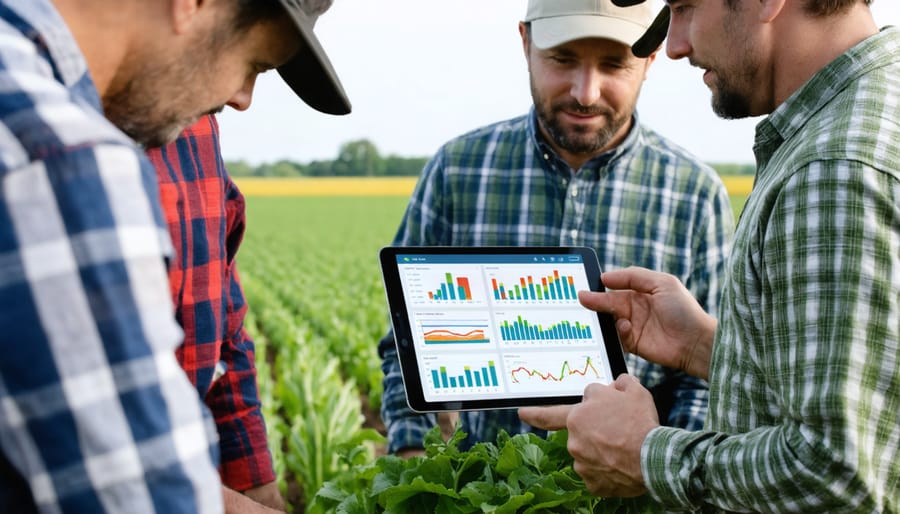
Innovation and Market Adaptation
In today’s rapidly evolving agricultural landscape, education plays a pivotal role in helping farmers stay competitive and sustainable. Modern farmers need to continually adapt to new digital farming technologies and changing market conditions, making ongoing learning essential for success.
Take the example of Sarah Thompson, a third-generation farmer from Lethbridge, who transformed her traditional grain operation by implementing precision agriculture techniques learned through agricultural extension programs. By applying her newfound knowledge, she reduced input costs by 20% while increasing yield by 15% in just two growing seasons.
Agricultural education enables farmers to recognize and respond to market opportunities quickly. Whether it’s shifting to organic production to meet growing consumer demand or adopting sustainable practices to access premium markets, educated farmers make informed decisions based on market analysis and technical expertise.
The Alberta Farm Technical Advisory Network shows that farmers who participate in continuous education programs are 40% more likely to successfully implement new technologies and adapt to market changes. These farmers also report higher satisfaction with their farming operations and better long-term financial stability.
Through workshops, online courses, and peer-learning networks, agricultural education provides the tools needed to evaluate and adopt innovations while managing risks effectively. This knowledge empowers farmers to make strategic choices that benefit both their operations and the broader agricultural community.
Environmental Stewardship Through Education
Soil Health Management
Understanding and implementing effective soil conservation practices is fundamental to sustainable agriculture in Alberta. Through hands-on education and practical workshops, farmers learn essential techniques for maintaining soil health, including crop rotation strategies, cover cropping, and reduced tillage methods.
Local success stories demonstrate the impact of proper soil management education. Take Dave Thompson’s farm near Red Deer, where implementing knowledge gained from agricultural extension programs led to a 30% increase in soil organic matter over five years. His experience now serves as a teaching model for other farmers in the region.
Educational initiatives focusing on soil testing and analysis help farmers make informed decisions about fertilization and amendments. Through soil health workshops offered by Alberta Agriculture and Forestry, producers learn to interpret soil test results and adjust their management practices accordingly. These programs emphasize the importance of maintaining proper pH levels, organic matter content, and beneficial microorganism populations.
Conservation agriculture education has evolved to include digital tools and monitoring systems. Farmers now learn to use soil moisture sensors, mapping technologies, and data analysis to make precise decisions about field management. This technology-integrated approach helps preserve soil structure while optimizing resource use.
Community-based learning initiatives, such as soil health field days and farmer-to-farmer mentorship programs, create valuable opportunities for knowledge sharing. These events allow experienced producers to demonstrate successful soil management techniques while building a supportive network of environmentally conscious farmers across the province.
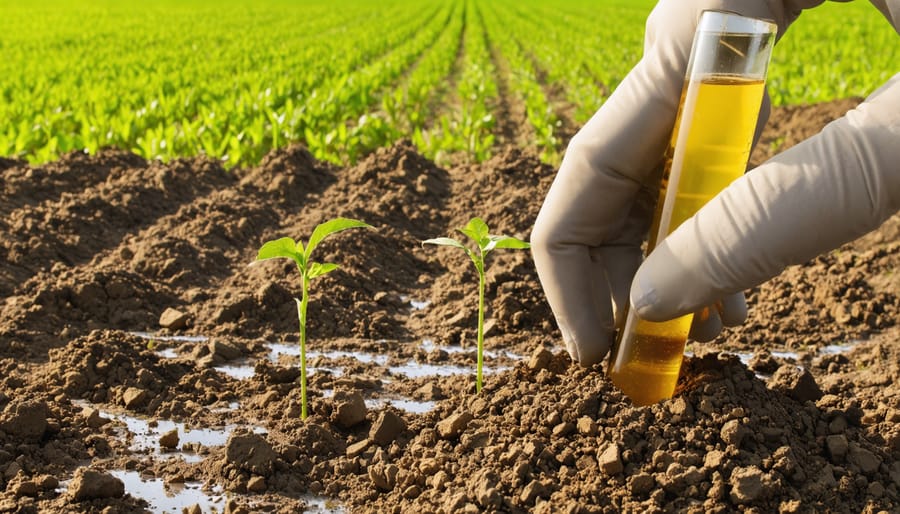
Carbon Footprint Reduction
Agricultural education plays a crucial role in helping farmers reduce their carbon footprint while maintaining productive operations. Across Alberta, specialized training programs are equipping farmers with the knowledge and tools needed to implement environmentally conscious farming practices.
Recent success stories include the Southern Alberta Carbon Smart Initiative, where over 200 farmers learned techniques for sustainable soil management. Through this program, participants reported an average 15% reduction in fuel consumption and a significant decrease in fertilizer use while maintaining crop yields.
Practical training sessions focus on key areas such as precision agriculture, conservation tillage, and efficient irrigation systems. Farmers learn to use GPS-guided equipment and soil monitoring technology to optimize resource use. These techniques not only reduce emissions but also lead to cost savings – participating farms report average annual savings of $15,000 through reduced input costs.
The University of Alberta’s Agricultural Extension Program offers workshops on carbon sequestration through improved grazing management. Participating ranchers have successfully increased soil organic matter by an average of 2% over three years, effectively storing more carbon while improving pasture health.
Local agricultural societies are also organizing peer-learning groups where experienced farmers share successful strategies for reducing greenhouse gas emissions. These include implementing rotational grazing, using cover crops, and adopting renewable energy solutions for farm operations.
The impact extends beyond individual farms. Communities utilizing these educational resources have collectively reduced their agricultural carbon emissions by an estimated 25,000 tonnes annually. This achievement demonstrates how agricultural education serves as a powerful tool in Canada’s journey toward sustainable farming practices.
Community Building Through Agricultural Knowledge

Mentorship Programs
The success of Alberta’s agricultural future lies in the hands-on knowledge transfer between experienced farmers and the next generation. Take Jim Henderson from Red Deer County, who has mentored over 15 young farmers through his structured mentorship program. “Seeing these young folks apply sustainable farming practices and succeed gives me hope for our agricultural future,” Henderson shares.
The Alberta Young Farmers Mentorship Initiative has become a cornerstone of agricultural education in the province, pairing newcomers with seasoned professionals who have decades of experience in crop rotation, soil management, and livestock care. Sarah Thompson, a third-generation farmer from Lethbridge, credits her mentor’s guidance for helping her transition her family’s 400-hectare farm to regenerative agriculture practices.
These mentorship programs go beyond traditional classroom learning, offering practical experience in everything from equipment operation to financial planning. The Southern Alberta Agricultural Society reports that farmers who participate in mentorship programs are 60% more likely to implement innovative farming techniques and achieve profitable operations within their first three years.
Many successful partnerships have emerged through formal programs like the Farm Management Canada’s mentorship network, which connects agricultural professionals across the country. These relationships often evolve into long-term partnerships, strengthening our farming communities and ensuring the preservation of valuable agricultural knowledge for generations to come.
Collaborative Learning Networks
In Alberta, farmer collaboration networks have revolutionized agricultural education through peer-to-peer learning initiatives. These networks have proven particularly effective in regions like Leduc County and Red Deer, where farmers regularly meet to share experiences and innovative practices.
The success of these collaborative learning environments is evident in the numbers: participating farms have reported a 30% increase in sustainable practice adoption and a 25% improvement in crop yields over the past five years. Local farming groups, such as the Central Alberta Grain Exchange, organize monthly field days where experienced farmers mentor newcomers in areas ranging from soil health management to precision agriculture techniques.
These networks particularly shine during challenging seasons, as demonstrated during the 2022 drought when knowledge sharing helped many farms maintain productivity through adapted irrigation methods. The Alberta Farm Knowledge Network, connecting over 2,000 farmers across the province, facilitates both in-person workshops and digital learning opportunities through their online platform.
The strength of these initiatives lies in their practical, hands-on approach. Rather than theoretical learning alone, farmers can witness successful implementations firsthand and discuss real-world challenges with peers who understand their specific context. This community-based learning model has become integral to agricultural education in Alberta, fostering resilience and innovation across the farming sector.
Future of Agricultural Education in Alberta
Agricultural education in Alberta is undergoing a remarkable transformation, driven by technological advancements and evolving industry needs. The integration of precision agriculture technologies and data analytics is reshaping how future farmers learn and operate. Educational institutions across the province are adapting their curricula to include hands-on experience with drone technology, GPS mapping, and smart farming systems.
Olds College, a pioneer in agricultural education, has launched its Smart Farm initiative, providing students with real-world experience in cutting-edge agricultural practices. This living laboratory allows learners to experiment with innovative solutions while maintaining Alberta’s strong farming traditions.
Distance learning and virtual reality simulations are making agricultural education more accessible to remote communities. Students can now participate in virtual crop management scenarios and livestock handling training from anywhere in the province, breaking down geographical barriers to education.
Sustainability and climate-smart agriculture are becoming central themes in educational programs. New courses focus on regenerative farming practices, water conservation, and soil health management – crucial skills for farming in Alberta’s diverse climate conditions.
Industry partnerships are playing an increasingly important role, with major agribusinesses collaborating with educational institutions to provide internships and work-integrated learning opportunities. These partnerships ensure that graduates are equipped with practical skills that meet current industry demands.
Indigenous agricultural knowledge is being incorporated into modern farming education, recognizing the value of traditional land management practices and their relevance to sustainable agriculture. This integration creates a more inclusive and comprehensive learning environment.
Looking ahead, micro-credentials and specialized certificates are expected to gain prominence, allowing farmers and agricultural professionals to upgrade specific skills without committing to full-degree programs. These flexible learning options will help the agricultural workforce stay current with rapidly evolving industry practices and technologies.
The future of agricultural education in Alberta promises to be more accessible, technology-driven, and responsive to both environmental challenges and market demands, while maintaining its strong connection to practical, hands-on learning experiences.
Agricultural education stands as a cornerstone of sustainable farming practices and rural community development across Alberta and beyond. As we’ve explored throughout this article, the impact of agricultural education extends far beyond the classroom, creating ripples of positive change throughout our farming communities. From improved crop yields and sustainable resource management to enhanced business acumen and technological adaptation, the benefits are both immediate and long-lasting.
The success stories from Alberta’s farming community demonstrate how agricultural education has transformed traditional farming operations into efficient, sustainable enterprises. By combining time-tested wisdom with modern innovations, educated farmers are better equipped to face challenges like climate variability, market fluctuations, and evolving consumer demands.
Looking ahead, the continued investment in agricultural education promises to shape the future of Canadian farming. Whether through formal institutions, community programs, or peer-to-peer learning networks, the knowledge gained empowers farmers to make informed decisions, adopt innovative practices, and build resilient agricultural businesses.
As our agricultural sector evolves, the role of education becomes increasingly vital. It serves not only as a tool for individual growth but as a catalyst for community development and environmental stewardship. By embracing agricultural education, we invest in more than just farming techniques – we invest in the future of sustainable food production, rural prosperity, and the preservation of our agricultural heritage for generations to come.


